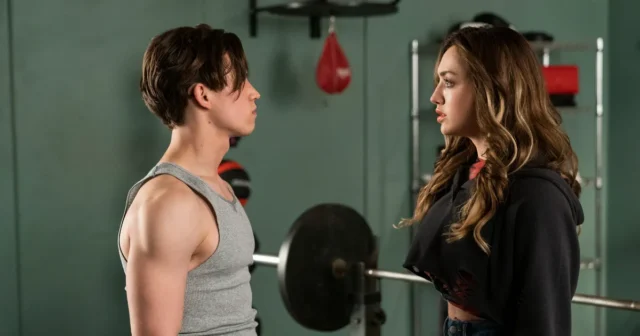Johnny carell Who is Cobra Kai for, exactly? Adults who grew up watching The Karate Kid films and still enjoy them find it difficult to comprehend why they would want to sit through an endless bombardment of teen drama, pitifully choreographed martial-arts combat, and lousy humour hardly fit for a TGIF sitcom. And if it’s young kids looking for some corny Disney Channel-style action, it’s difficult to see why they’d be interested in the proceedings’ obsession with all things ’80s.
The show’s blending of the infantile and nostalgic looks to be an attempt to appeal to two different audiences, but its immature corniness is so over-the-top that it mostly comes off as a series made for Steve Carell’s character in The 40-Year-Old Virgin.

While Cobra Kai is known for its Karate Kid fandom, the film franchise’s third feature, which failed with critics and viewers alike in 1989 and hasn’t been resurrected in the years following, has almost no such feelings.
Nonetheless, Terry Silver (Thomas Ian Griffith), who arrives in town to help John Kreese (Martin Kove) face the now-merged dojos of Daniel (Ralph Macchio) and Johnny (Ralph Macchio), is a big component of the YouTube-turned-Netflix series’ fourth season (Dec. 31). (William Zabka). Those few people who enjoy The Karate Kid Part III will undoubtedly be ecstatic.
For the others, Silver’s appearance is just the latest nostalgic twist for what is still the weirdest show on television. It picks up right after last season’s climax, with Johnny and Daniel reluctantly joining forces against Kreese and Silver, the latter of whom is persuaded by his former master to abandon his rich lifestyle of seaside parties (complete with fancy phonies and tofu appetisers) and rejoin Cobra Kai.
Johnny and Kreese, comrades-turned-enemies, exemplify the material’s concept of manliness as old-school tough and brutal; they drink Coors, not Blue Moon (as Daniel does).
Although Daniel may not agree with this retrograde perspective, it is consistent with Cobra Kai’s overriding belief that maturing is for sissies. To be a real man, one must put aside all adult issues and focus on what really matters: perpetually repeating useless high school karate beefs.
Daniel, Johnny, and Kreese’s reluctance to let go of the past is the reason they spend every waking hour training, hanging out with, antagonising, and weaponizing youths.
They’re perpetually reliving their golden days as man-children, and the programme naturally celebrates their adolescence. Simultaneously, it’s consumed with the idea of surrogate parenting, a role that Daniel, Johnny, Kreese, and now Silver desire to perform with every child in their area.
Only the late Mr. Miyagi, whom Daniel brings up every five minutes in over-the-top reverent tones, receives more love and attention from these adults than Daniel’s daughter Sam (Mary Mouser) and son Anthony (Griffin Santopietro), Johnny’s biological son Robby (Tanner Buchanan) and his girlfriend’s son Miguel (Xolo Mariduea), and furious Cobra Kai fighter Tory (Peyton List), receives more love and attention
The same-as-it-ever-was narrative of Cobra Kai’s fourth season revolves around Johnny and Daniel’s tense alliance. The essence of their issue is that Daniel’s peaceful Miyagi-do promotes defence, whilst Johnny’s gung-ho Eagle Fang advocates offence. The concept of integrating those two elements—defense and offense?—is portrayed as a revolutionary, quasi-mythic holy grail, which will come as a surprise to anyone who has ever played soccer, football, basketball, or any other sport. Such is the sophistication of Jon Hurwitz and Hayden Schlossberg’s slapstick, whose plotting and performances are never less than crude, typified by an array of cartoony reaction shots, and led by Macchio and Zabka, whose acting is almost as wooden as their fighting skills (seriously, the 60-year-old Macchio looks like he couldn’t beat up a torn paper bag).
Cobra Kai can only be enjoyed ironically, as it operates with all the dexterity and subtlety of a roundhouse kick to the face. The strange, latent homoeroticism of Johnny and Daniel’s fascination with getting physical with high school males, as well as Daniel’s continual discussion about how “awesome” karate is, create some inadvertent hilarity. On this point, everyone agrees with Daniel, and it’s been repeated so many times that Hurwitz and Schlossberg appear frantic to prove their saga’s awesomeness. Unfortunately, there’s no proof to back up those assertions, and the martial arts exhibited here are shockingly awful. The “topical” jokes, most of which include caveman-like Johnny wrestling with modern ideals like feminism and correct pronoun usage, are also amusing.
Cobra Kai’s fourth season mixes and matches the allegiances of its protagonists, who are in a constant state of flux about who they have feelings for, who they view as their father figure, and what kind of good/evil person they want to be. It’s also focused on Anthony’s middle-school conflict with new-kid-in-town Kenny (Dallas Dupree Young), which keeps the show moving backwards toward the crib. Silver’s arrival as a cunning villain who may or may not be Kreese’s lap dog adds a splash of colour to the storey, but not enough to change the soap opera-style over-emoting and melodramatic cliffhangers. Characters occasionally remark on the absurdity of being so involved in young karate rivalries; for example, Silver states in The Karate Kid Part III about scaring Daniel, “It sounds insane just talking about it.”
Despite paying lip service to the obvious, Cobra Kai maintains that Daniel, Johnny, and the rest of the gang are only truly themselves when they’re working to make their dojos king of the hill—in this fourth season, that means champions of the All Valley tournament, an event popular enough to attract a music superstar as a guest performer.
Cobra Kai’s obvious nostalgia is of the dudebro sort, as evidenced by Johnny’s neanderthal demeanour and frequent references to Rocky III, Bloodsport, and Top Gun.
Its regressive sitcom form, which reduces its humour and romantic/familial/peer conflicts to fourth-grade level, is even more unpleasant.
That might have given the show a charming charm for a season or two. However, at this point, it’s just an indication of inexorable immaturity.
Also Read:














































